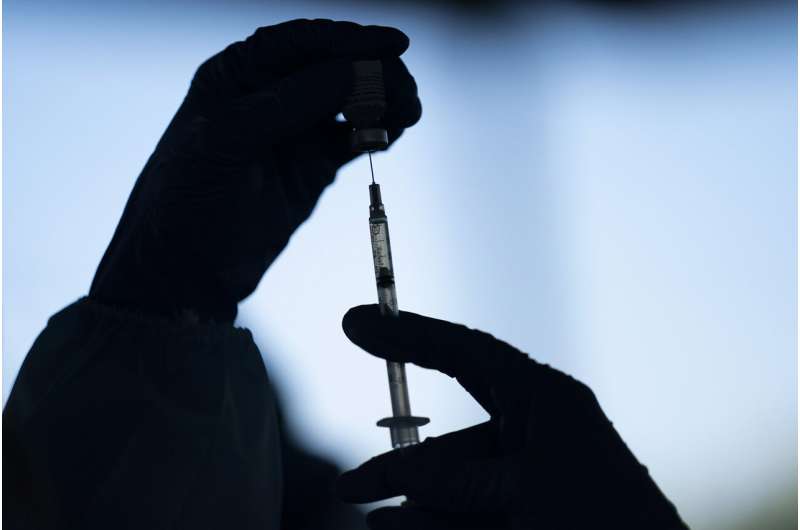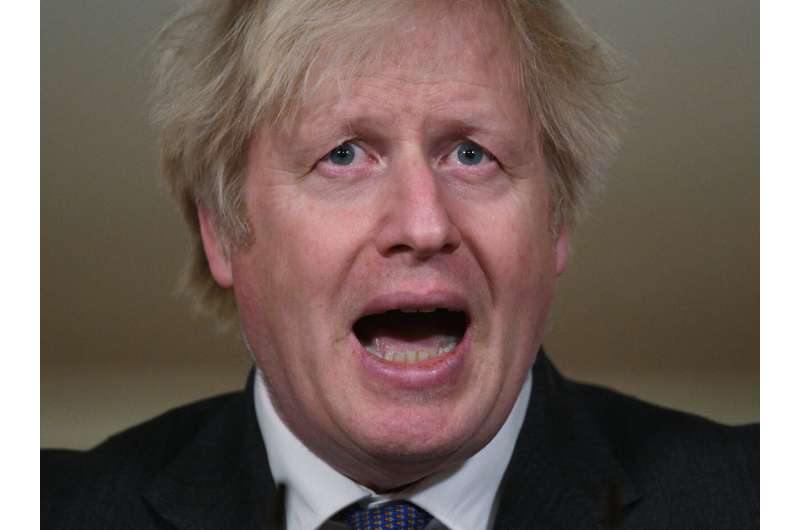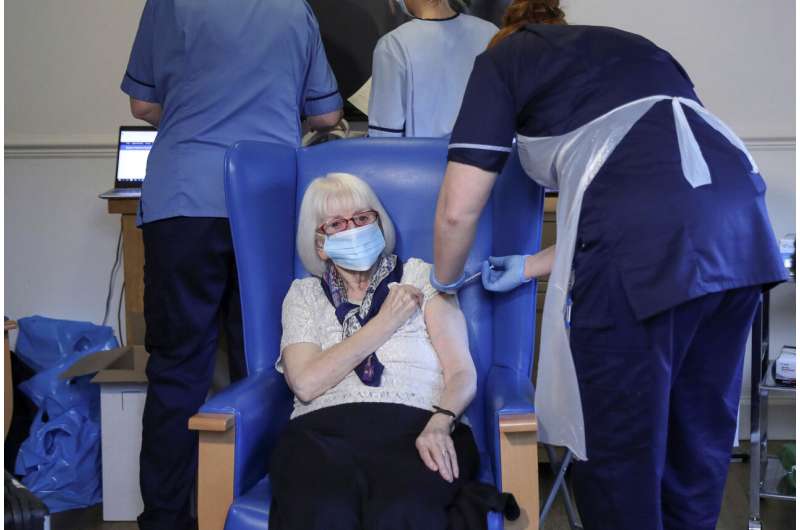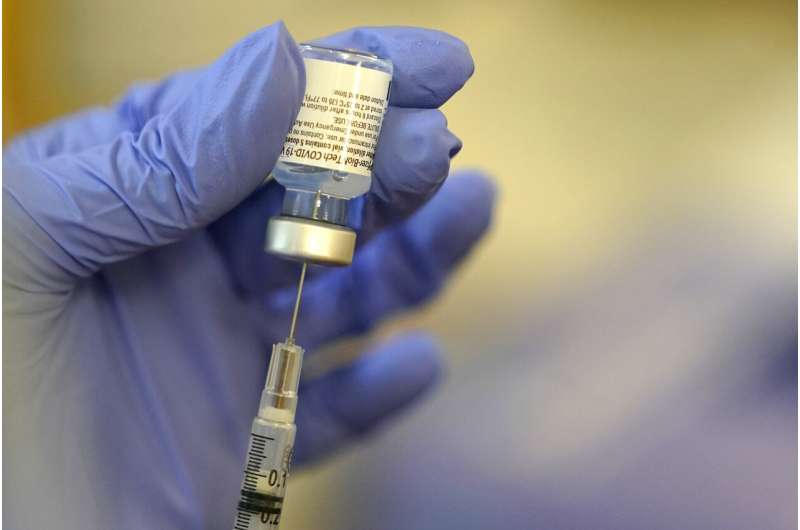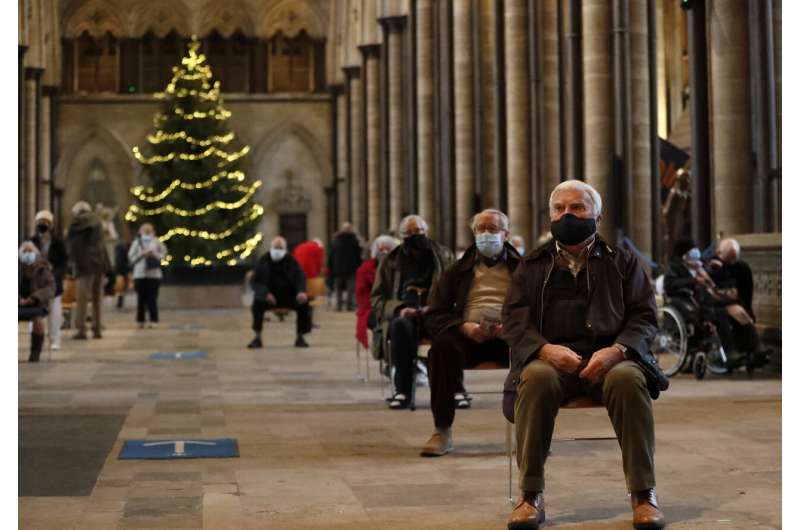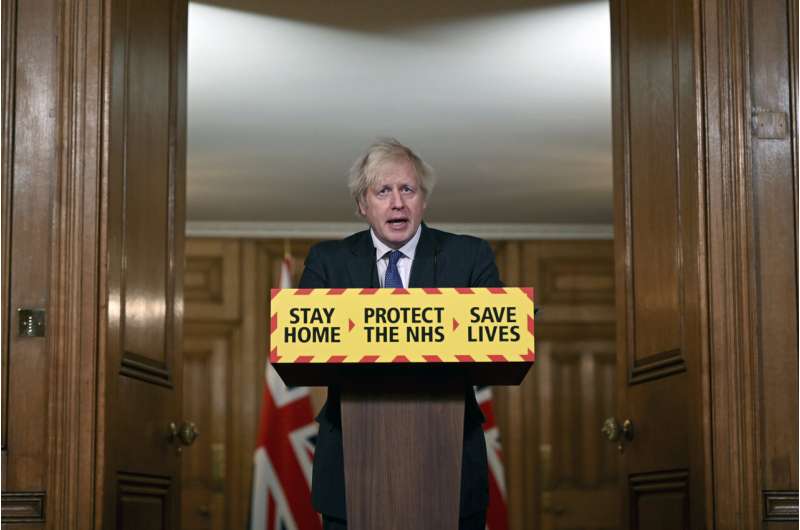A medical staff member prepares the Pfizer-BioNTech COVID-19 vaccine at Tudor Ranch in Mecca, Calif., Thursday, Jan. 21, 2021. (AP Photo/Jae C. Hong)
A major British doctors' group says the U.K. government should "urgently review" its decision to give people a second dose of the Pfizer-BioNTech coronavirus vaccine up to 12 weeks after the first, rather than the shorter gap recommended by the manufacturer and the World Health Organization.
The U.K., which has Europe's deadliest coronavirus outbreak, adopted the policy in order to give as many people as possible a first dose of vaccine quickly. So far almost 5.9 million people in Britain have received a shot of either a vaccine made by U.S. drugmaker Pfizer and Germany's BioNTech or one developed by U.K.-Swedish pharmaceutical giant AstraZeneca and Oxford University.
AstraZeneca has said it believes a first dose of its vaccine offers protection after 12 weeks, but Pfizer says it has not tested the efficacy of its jab after such a long gap.
The British Medical Association on Saturday urged England's chief medical officer to "urgently review the U.K.'s current position of second doses after 12 weeks."
In a statement, the association said there was "growing concern from the medical profession regarding the delay of the second dose of the Pfizer-BioNTech vaccine as Britain's strategy has become increasingly isolated from many other countries."
"No other nation has adopted the U.K.'s approach," Dr. Chaand Nagpaul, chairman of the BMA council, told the BBC.
-
Britain's Prime Minister Boris Johnson speaks during a coronavirus press conference at 10 Downing Street in London, Friday Jan. 22, 2021. Johnson announced that the new variant of COVID-19, which was first discovered in the south of England, may be linked with a possible increase in the mortality rate. (Leon Neal/Pool via AP)
-
Resident Margaret Keating, 88, receives the Pfizer BioNTech COVID-19 vaccine at the Abercorn House Care Home in Hamilton, Scotland, Monday Dec. 14, 2020. (Russell Cheyne/PA via AP)
-
A pharmacist prepares a syringe of the Pfizer-BioNTech COVID-19 vaccine Friday, Jan. 8, 2021, at Queen Anne Healthcare, a skilled nursing and rehabilitation facility in Seattle. Pfizer has committed to supply up to 40 million doses of its COVID-19 vaccine this year to a World Health Organization-backed effort to get affordable vaccines to 92 poor and middle-income countries. The deal announced Friday, Jan. 22 will supply the shots to the program known as COVAX. (AP Photo/Ted S. Warren)
-
A health worker prepares the Pfizer-BioNTech vaccine inside Salisbury Cathedral in Salisbury, England, Wednesday, Jan. 20, 2021. Salisbury Cathedral opened its doors for the second time as a venue for the Sarum South Primary Care Network COVID-19 Local Vaccination Service. (AP Photo/Frank Augstein)
-
People sit and relax after receiving their Pfizer-BioNTech vaccination at Salisbury Cathedral in Salisbury, England, Wednesday, Jan. 20, 2021. Salisbury Cathedral opened its doors for the second time as a venue for the Sarum South Primary Care Network COVID-19 Local Vaccination Service. (AP Photo/Frank Augstein)
-
Britain's Prime Minister Boris Johnson speaks during a coronavirus press conference at 10 Downing Street in London, Friday Jan. 22, 2021. Johnson announced that the new variant of COVID-19, which was first discovered in the south of England, may be linked with an increase in the mortality rate. (Leon Neal/Pool via AP)
He said the WHO had recommended that the second Pfizer vaccine shot could be given up to six weeks after the first but only "in exceptional circumstances."
"I do understand the trade-off and the rationale, but if that was the right thing to do then we would see other nations following suit," Nagpaul said.
Yvonne Doyle, medical director of Public Health England, defended the decision as "a reasonable scientific balance on the basis of both supply and also protecting the most people."
Researchers in Britain have begun collecting blood samples from newly vaccinated people in order to study how many antibodies they are producing at different intervals, from 3 weeks to 24 months, to get an answer to the question of what timing is best for the shots.
The doctors' concerns came a day after government medical advisers said there was evidence that a new variant of the virus first identified in southeast England carries a greater risk of death than the original strain.
Chief Scientific Adviser Patrick Vallance said Friday "that there is evidence that there is an increased risk for those who have the new variant," which is also more transmissible than the original virus. He said the new strain might be about 30% more deadly, but stressed that "the evidence is not yet strong" and more research is needed.
© 2021 The Associated Press. All rights reserved. This material may not be published, broadcast, rewritten or redistributed without permission.
